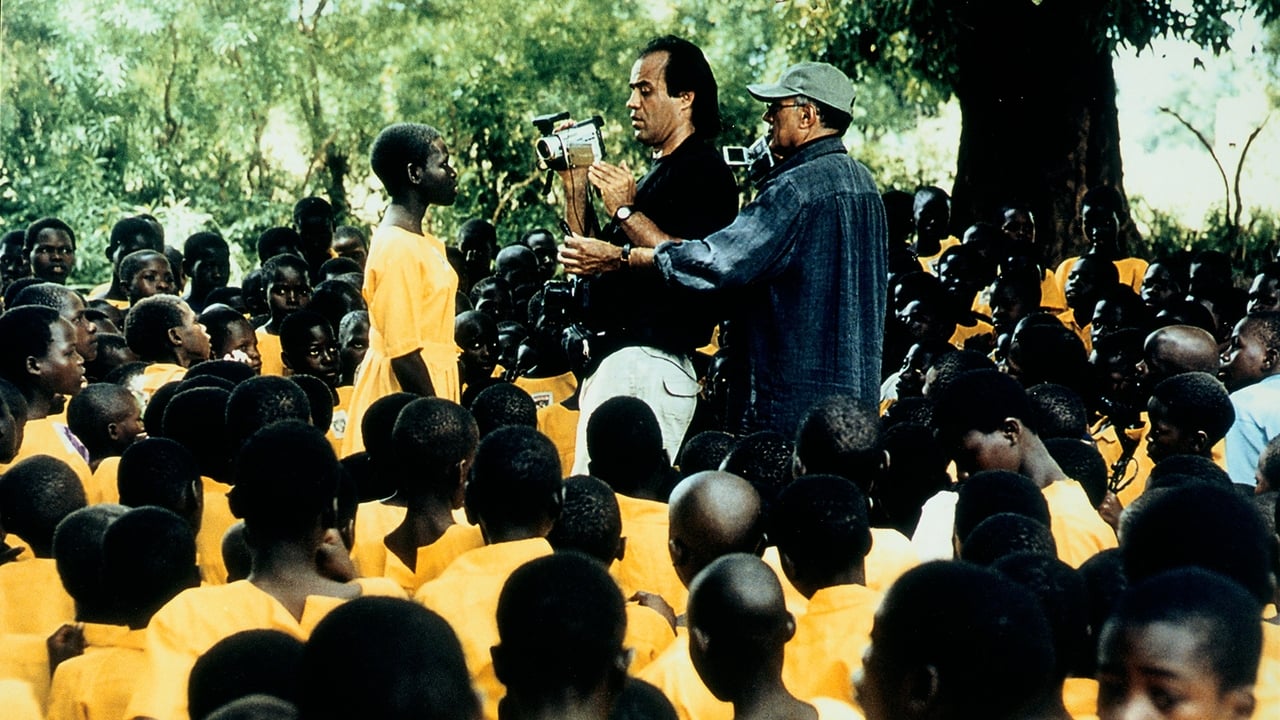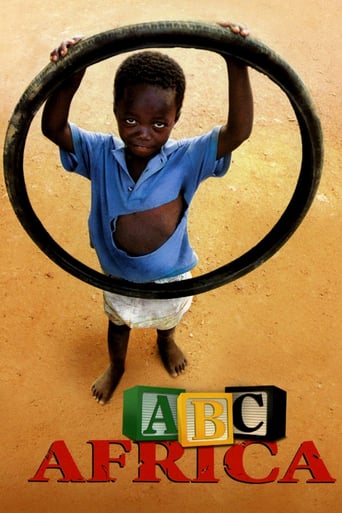

Truly Dreadful Film
... View MoreA Masterpiece!
... View MoreEntertaining from beginning to end, it maintains the spirit of the franchise while establishing it's own seal with a fun cast
... View MoreOne of the film's great tricks is that, for a time, you think it will go down a rabbit hole of unrealistic glorification.
... View MoreThe best thing that can be said about "ABC Africa" is that its making is a victory for digital format of shooting films.When a film maker of Abbas Kiarostami's stature decides to shoot a documentary film on Africa using his tiny digital video camera in some way this gesture gives credibility to the belief that digital video is going to be adopted by many more leading filmmakers in the years to come. Kiarostami has been able to shoot some of the most incredible shots including one that was filmed in darkness. As far as this film is concerned the best lesson that can be learned is that of hope,joy and happiness. Who in this world can remain unaffected when he/she is having a glimpse of impoverished African children who are full of joy and radiance on their faces despite finding themselves encircled in a world of misery.There is also an element of sadness as according to the visuals shot by Kiarostami,Uganda like other African countries has lot of greenery, nature and natural resources.But as the large part of the entire African continent is ruled by military leaders and dictators,it is hard to even assume that common people can find some relief from hunger,famine,wars and tragedies.Kiarostami has filmed ABC Africa in a cinema vérité manner. This is the reason why the entire film appears as non partial.Lastly it must be stated that despite being harsh in tone,this film offers substantial amount of optimism in the form of adoption of an orphaned baby girl.The best thing to watch in this film : A song called Sanga Lo, Sanga Lo which appears too often.
... View MoreAsked by the UN International Fund for Economic Development (IFAD) to make a film documenting the plight of millions of Ugandan orphans ravaged by the recent civil war and the scourge of AIDS, Iranian director Abbas Kiarostami responded with something much more, a personal and poetic film that allows us to see the people, the land, and the culture of Uganda without relentless images of despair. The documentary, ABC Africa, captures a kaleidoscope of faces of children and adults that display an enthusiasm for life that belies the grim statistics. The children of Kampala may be without parents but they are still children, ready to burst into wondrous song or dance, or simply mug for the camera when given the opportunity.ABC Africa illuminates the work of the Uganda Women's Effort to Save orphans (UWESCO), an organization of women willing to adopt these children even though they may have many other mouths to feed. There is no voice-over narration in the film, only interviews with Ugandan relief workers who describe the extent of the problems they face. In trademark Kiarostami fashion, as a car drives through the streets of Kampala and the countryside, the digital hand-held camera records the passing scene, revealing both the beauty and the ugliness of Ugandan life. In one extraordinary sequence, we share the grief as the camera pans into a hospital for children dying of AIDS and follows a dead child being wrapped in a blanket and put into a makeshift cardboard box, then wheeled away on a bicycle to an unknown burial ground.Equally memorable is a five-minute segment shot in total darkness inside a hotel where the power has failed due to regular midnight power cuts. All we hear is the conversation of two men in Farsi as they struggle to find their hotel room, a hint of the fear that Ugandans face each night and a metaphor for the darkness in which millions of Africans live. The film also shows the well-meaning but questionable efforts of a young Austrian family to adopt an orphaned girl found on the streets and bring her to Austria. Though some might have wanted ABC Africa to address the social, economic, and political causes that have left 1.6 million children without parents, Kiarostami's camera is simply present to each given moment and the result is a revelation.
... View MoreMoving awkardly and intrusively through Ugandan villages, in a stated attempt to document the work of an Aids orphanage and the crisis of Aids in Uganda, Kiarostami offers us contrived glimpses of a so called "reality." He fails to tell any particular story of poverty, Aids, NGOs, or orphaned children. Instead, he indulges in voyeurism and paternalism, revealing the great distance between the struggles and daily realities of Ugandan villages and the touristic comforts of Western filmmakers staying at the Kampala hotel.Originally intended as scoping work for a subsequent project, ABC Africa might have been a more in-depth and thought-provokig piece of work had he used this footage as preliminary work. It can not stand on its own as a piece of in-depth documentation as it does nothing more than provide images intended to shock Western audiences about poverty in Africa. Long, unedited shots of kids playing in front of the camera show the intrusion of Western filmmakers. Rushing to capture "good footage" of a young boy pushing a girl child carrying heavy wood or of the orphanage staff preparing the body of a child who recently died compromises the integrity of his work and reveals the cursory nature of the footage and of his experience in Uganda.While a certain spirit of village life in Africa is conveyed, it's authenticity is sacrificed by Kiarostami's inability to engage his "actors" as individuals with stories to share. Despite his articulated goal to provide images for people to construct their own meaning and build personal "movies" in their mind, Kirostami's casual style objectifies the experiences that he tries to depict authentically.
... View MoreJust saw this at the Doubletake Documentary Film Festival, where it world premiered as part of a tribute to Kiarostami's works. The film is a self-described "notebook" done on handheld DV, which was originally intended only as a rough record of his UN-sponsored trip to AIDS-ridden Uganda. Upon viewing the footage, Kiarostami decided it could stand on its own. I agree. Although it only gives a partial glimpse into the Ugandan people and their methods of dealing with the current crisis, limiting itself to a scene set in a UWESO-run hospital, it is a stark and yet poetic evocation of the spirit of place. You get the feeling that you are wandering through the same streets and towns, an advantage of the new digital technology and its impact on the viewer.This film will be featured at Cannes 2001 and will eventually - one hopes - make its way to a no doubt limited release in this country. If you get the chance, by all means check this one out.
... View More